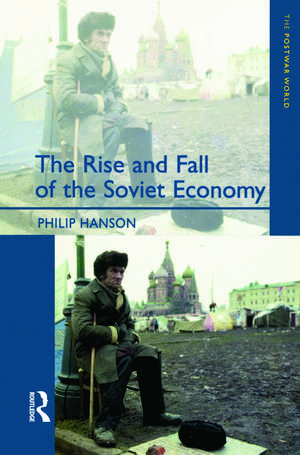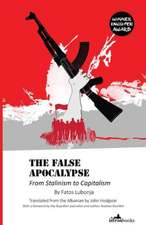The Rise and Fall of the The Soviet Economy: An Economic History of the USSR 1945 - 1991: The Postwar World
Autor Philip Hansonen Limba Engleză Paperback – 23 ian 2003
| Toate formatele și edițiile | Preț | Express |
|---|---|---|
| Paperback (1) | 386.74 lei 6-8 săpt. | |
| Taylor & Francis – 23 ian 2003 | 386.74 lei 6-8 săpt. | |
| Hardback (1) | 1008.97 lei 6-8 săpt. | |
| Taylor & Francis – 21 ian 2016 | 1008.97 lei 6-8 săpt. |
Preț: 386.74 lei
Nou
Puncte Express: 580
Preț estimativ în valută:
74.03€ • 80.44$ • 62.22£
74.03€ • 80.44$ • 62.22£
Carte tipărită la comandă
Livrare economică 21 aprilie-05 mai
Preluare comenzi: 021 569.72.76
Specificații
ISBN-13: 9780582299580
ISBN-10: 0582299586
Pagini: 292
Dimensiuni: 156 x 234 x 16 mm
Greutate: 0.45 kg
Ediția:1
Editura: Taylor & Francis
Colecția Routledge
Seria The Postwar World
Locul publicării:Oxford, United Kingdom
ISBN-10: 0582299586
Pagini: 292
Dimensiuni: 156 x 234 x 16 mm
Greutate: 0.45 kg
Ediția:1
Editura: Taylor & Francis
Colecția Routledge
Seria The Postwar World
Locul publicării:Oxford, United Kingdom
Public țintă
UndergraduateCuprins
List of tables. List of Figures. Acknowledgements. Editorial Foreword. Introduction. 1. The Starting Point: the Stalinist Economic System and the Aftermath of War. 2. Khruschev: Home Rewarded, 1953-60. 3. Khruschev: Things Fall Apart, 1960-64. 4. A New Start: Brezhnev, 1964-73. 5. The 'Era of Stagnation': 1973-82. 6. Three Funerals and a Coronation: November 1982-March 1985. 7. Gorbachev and Catastrioka. 8. The End-game, 1989-91. 9. The Soviet Economy in Retrospect. Bibliography. Index.
Descriere
This new textbook draws on personal experience and literary sources, including memoirs, as well as available economic data and analyses, to illustrate the reality of everyday life and of economic policy making in the post-war Soviet Union. The author argues that the Soviet economic system was capable of producing economic growth, and did for most of its existence exhibit growth. But it revealed over a time a key weakness compared with capitalism: a systemic inability to cope well with technological change, which doomed the Soviet economy in the long-run. Moreover, 'success' in partially liberalising Soviet society, so that terror receded into the background, reduced the effectiveness of a top-downeconomic system that relied on authority and obedience. Of major interest to courses on the Soviet experience in departments of history, politics and economics




























